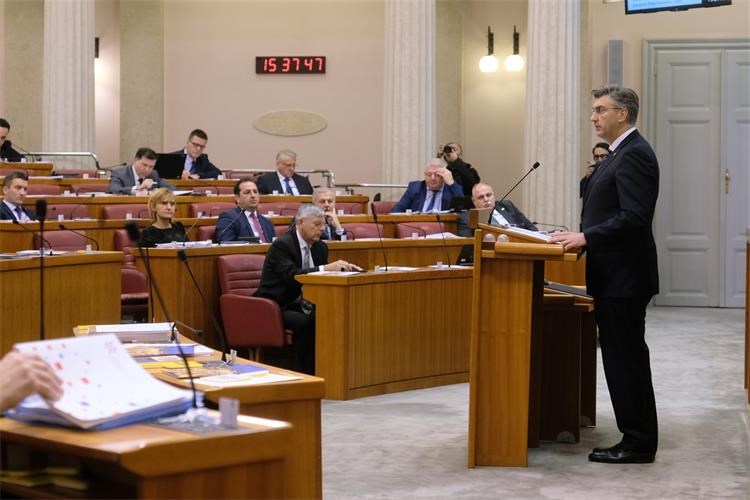


"Twenty-eight years ago, Croatia was internationally recognised and today is also the 22nd anniversary of the completion of the peaceful reintegration of the Croatian Danube River Region into the constitutional order, which is Croatia's success and president Tudjman's political legacy," Plenkovic posted on Twitter.
"In less than three decades, Croatia won the Homeland War thanks to Croatian defenders, it politically established itself internationally as a member of the European Union and NATO, and today presides over the Council of the European Union at a crucial time for the future of Europe."
Twenty-eight years ago, Croatia was recognised by the EU member states. Germany, which together with the Vatican played a key role in that, established diplomatic relations with Croatia on 15 January 1992. At the time, the war was on and almost a third of the country was under occupation by the Yugoslav army and Serb rebels. On the same day in 1998, Croatia completed the peaceful reintegration of the Danube River Region, reclaiming its recognised borders.
Croatia will preside over the Council of the EU for the next six months, just seven years after its accession and 30 years after the Great Serbia aggression, which is a huge achievement for the country and all its citizens, Prime Minister Andrej Plenkovic underscored in parliament on Wednesday.
Plenkovic said this while presenting the priorities of Croatia's presidency of the Council of the European Union and a report on meetings of the European Council over the past year.
In his introduction Plenkovic underscored that he was submitting his report precisely on the 28th anniversary of Croatia's international recognition and the 22nd anniversary of the peaceful reintegration of its Danube River region.
Croatia has the opportunity to be at the helm of the second largest global economy and a community of half a billion people, Plenkovic said, adding that Croatia's presidency is a huge achievement for the entire country and all its citizens and particularly those who gave the most for Croatia's freedom - its defenders.
Since 2013 Croatia has received HRK 20 billion from the EU, he noted.
"The European Union is a family of European nations and the Croatian nation is committed to it, it is committed to its Christian roots and has always belonged to that community and shared common objectives and values, and a common future, he said.
"Our partners today more than ever respect and recognise our difficult path and respect Croatia's position," said Plenkovic recalling the words of European Commission President Ursula von der Leyen, who on Tuesday said in the European Parliament that Croatia had passed through bloodshed only to become the very heart of the European Union.
For a strong Europe in a world of challenges
Croatia's priorities during its presidency are based on four pillars - a Europe that develops, a Europe that connects, a Europe that protects and an influential Europe, said Plenkovic, explaining that during its presidency more than 200 meetings would be held in the country and that Croatia would preside over more than 1,400 meetings in Brussels.
"We want an economically strong Europe to strengthen our countries as well, including Croatia, and make our citizens' status better. We want stronger European infrastructure, better human potential, better security for our citizens and we want to make the Union a leader on the global scene based on the values we share," he added.
The most important political issues during Croatia's EU chairmanship are the EU's budget for the period from 2021 to 2027, the completion of Great Britain's exit from the EU, promotion of the EU membership prospects of Southeast European countries, and work on the Conference on the Future of Europe, Plenkovic said, adding that in May Croatia would host an EU - Western Balkans summit, 20 years after the first one was held in Zagreb.
Croatia expects the summit to put the enlargement policy in a "new, better structured and more affirmative context" than has been the case since Croatia's accession in 2013, and one of the objectives is to unblock the opening of negotiations with North Macedonia and Albania, he said.
"I think that current talks (on the matter) are heading in a good direction," said Plenkovic.
He hopes that negotiations on the new EU budget will be concluded during Croatia's presidency.
In that regard, he explained that there are four options which need to be reconciled.
The European Commission has proposed a budget of 1.11% of the EU's Gross National Income (GNI), net contributing countries are asking that that be 1% of GNI, countries that are called friends of cohesion are seeking more funding for agriculture and cohesion policies, and the European Parliament is proposing that the budget be as much as 1.3% of GNI, he said.
European Council President Charles Michel is in charge of achieving a compromise so Croatia will have more maneuvering room to advocate its own interests, Plenkovic said.
Croatia will launch preparations for the Conference on the Future of Europe and it hopes that it will restore optimism in Europe and make Croatian and European citizens interested in Europe, said Plenkovic.
He concluded by saying that Croatia will continue to work on preparations to enter the Schengen Area and join the European Exchange Mechanism and later introduce the euro, as well as on the implementation of the new European Green Deal, designed to make Europe carbon-free by 2050, and on policies related to migrations.
Text: Hina